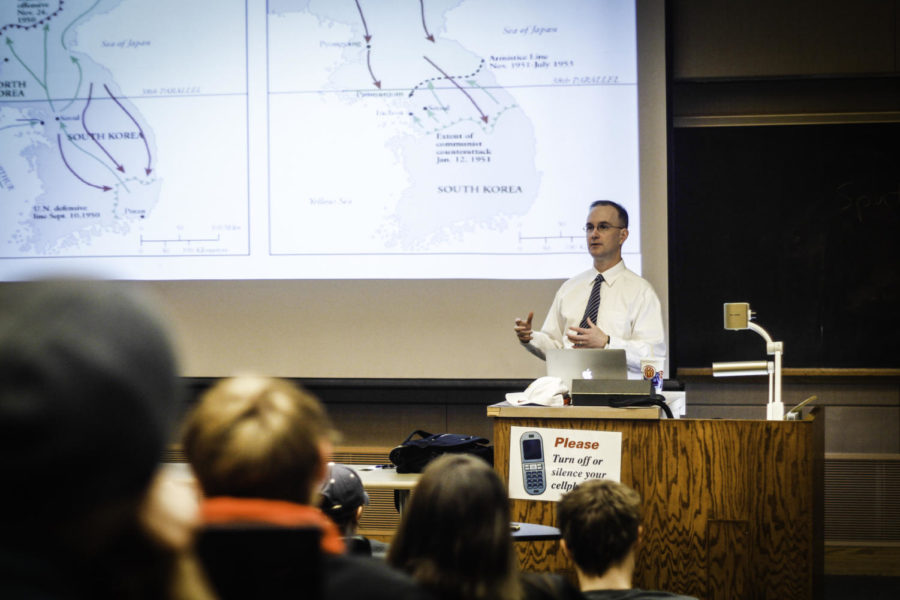ISU assistant professor publishes book: ‘Information at Sea’ pulls from Wolters’ personal Navy experience
Tomhas Huhnke/Iowa State Daily
Timothy Wolters in the Molecular Biology Building on April 1. Wolters has just authored his first book. His experience as a captain in the U.S. Navy has afforded him an “invaluable perspective” for completing the book.
April 8, 2014
Timothy Wolters, assistant professor of history and a captain in the U.S. Navy Reserve, has published his first book about the command and control of the U.S. Navy.
As a former Navy ROTC student at the University of Notre Dame, Wolters credits his passion for the Navy to his family.
“Both my grandfathers were in the Navy and my father was in the Navy, so when I was in high school and got the recruitment postcard, I just knew the Navy was the perfect fit,” Wolters said.
Wolters first earned an engineering degree through the U.S. Navy’s nuclear power program by studying and operating submarines. He said his experiences in the program and learning more about how the Navy operates helped create his interest in history.
“When you understand the historic background of an institution and you have a current knowledge of how they operate, it makes you a better scholar,” Wolters said.
After finishing active duty, Wolters decided to pursue the history of technology.
Wolters went on many research trips to different universities, interviewed various sources and learned the stories of past submarine operators to complete his book.
“If history is taught as a series of facts and dates, it can be very dry,” Wolters said. “But when you teach it as a series of stories it all of sudden becomes very interesting, and that’s what I tried to do in my book.”
After working on the book for nine years, “Information at Sea: Shipboard Command and Control in the U.S. Navy, from Mobile Bay to Okinawa” was published in the fall of 2013 by John Hopkins University Press.
Wolters’ book discusses how the Navy has operated throughout history and the various difficulties it has faced. It also addresses how Navy personnel managed information before today’s technological advances.
Wolters hopes his book will offer interesting lessons for not only other historians but also current Navy personnel to learn from.
“My hope is that naval officers will read the book and think about their current jobs but with different perspectives,” Wolters said.
Norman Friedman, also a naval analyst and author, reviewed “Information at Sea” for the magazine Proceedings.
“This is an excellent and important book,” Friedman said in Proceedings. “The author, a U.S. Navy Reserve officer, is well-qualified to point to the distinction between the visible side of sea power, as reflected in ships and in naval weapons and the much less visible but absolutely essential side involving the use of information.”
William M. McBride, of the U.S. Naval Academy, also reviewed Wolter’s book.
“An extremely well-researched and well-written history of the U.S. Navy’s efforts to develop the technology and technological systems necessary to manage operations at sea, especially during war,” McBride said.
“Information at Sea: Shipboard Command and Control in the U.S. Navy, from Mobile Bay to Okinawa” can be checked out at Parks Library and is available for purchase through Amazon.







